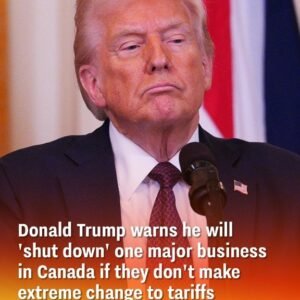President Donald Trump has warned that he will shut down a major Canadian business if Canada does not implement drastic tariff changes. His statement comes as trade tensions between the two nations reach new heights. The latest threat follows his administration’s decision to double tariffs on key Canadian exports.
The ongoing dispute began with Canada’s recent decision to impose a 25% surcharge on electricity exports to the U.S. This surcharge is expected to increase utility bills for millions of American households and businesses, sparking outrage in Washington. Trump views the move as an unfair trade practice aimed at pressuring the U.S.
In response, Trump announced that tariffs on Canadian steel and aluminum would be raised from 25% to 50%. The administration argues that these measures will counteract Canada’s tariff policies and protect American industries from economic harm. However, the impact on U.S. manufacturers remains uncertain.
The president’s warning about shutting down a major Canadian business is the most aggressive statement in the trade dispute so far. While he did not specify which company would be affected, the threat has sent shockwaves through the Canadian business community. The auto industry, a key sector in Canada, could be a primary target.
Trump’s remarks signal a willingness to escalate economic pressure if Canada does not reverse its tariff policies. The U.S. government has indicated that additional tariffs on Canadian automobiles may be imposed as early as next month, further increasing tensions between the two countries.
Premier Doug Ford has defended Canada’s electricity surcharge, stating that it is necessary to protect Ontario’s energy market. He argues that Canada has the right to implement trade policies that benefit its economy, just as the U.S. does. The move has received mixed reactions domestically.
Many Canadian business leaders are concerned that Trump’s threats could lead to long-term economic damage. Industries that rely on exports to the U.S. fear declining sales, job losses, and reduced investment if tariffs continue to rise. The uncertainty is causing unease among investors.
Meanwhile, U.S. manufacturers are also feeling the strain. Higher tariffs on Canadian steel and aluminum could increase production costs for American companies. These costs may eventually be passed on to consumers, affecting prices for goods ranging from automobiles to household appliances.
The dispute highlights the growing role of energy policy in trade conflicts. Canada’s electricity tariff directly affects states like New York and Michigan, where imported electricity is a crucial part of the energy supply. Rising costs could put pressure on local governments to intervene.
Trump’s use of social media to announce policy changes has also drawn attention. His threats to shut down a Canadian business were posted on Truth Social, his preferred communication platform. The move reflects a broader trend of using social media to shape trade policy discussions.
The escalating trade war is raising concerns among economic analysts. Some experts warn that continued retaliation from both sides could disrupt North American trade relations permanently. The U.S. and Canada have long been major trading partners, and prolonged tensions could harm both economies.
The situation is also being closely watched by international trade organizations. If the dispute continues, it could set a precedent for other nations to adopt aggressive trade tactics. This shift could lead to a more fragmented global trade system, impacting economic stability worldwide.
Despite the rising tensions, diplomatic efforts to resolve the dispute remain possible. Trade officials from both countries are expected to hold discussions in the coming weeks. The hope is to find a compromise that avoids further economic damage while addressing concerns from both sides.
The outcome of this conflict will shape future U.S.-Canada trade relations. If negotiations fail, both countries risk long-term economic consequences. The auto, steel, and energy industries are at the center of the dispute, and any resolution will need to address their concerns.
As the situation unfolds, businesses and consumers on both sides of the border are bracing for the impact. Whether Trump follows through on his threat to shut down a Canadian business remains to be seen, but one thing is clear: North America’s trade landscape is at a critical crossroads.
